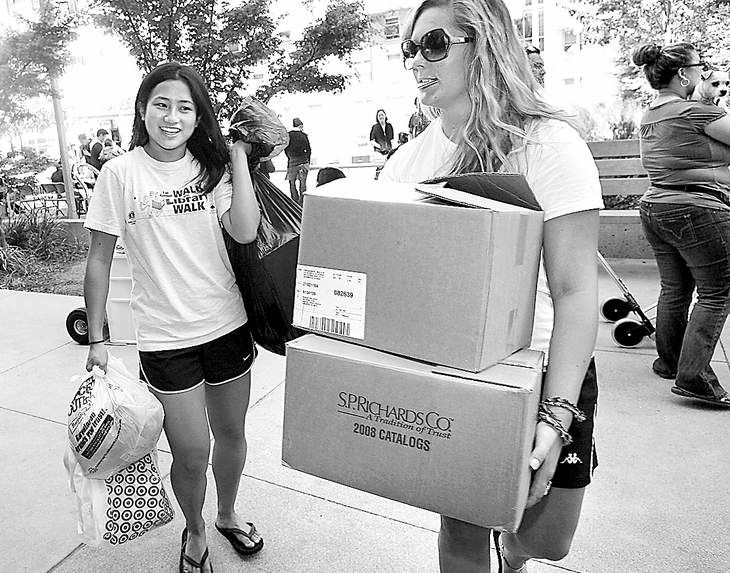Compatibility survey pairs up roommates
Published 5:00 am Thursday, September 4, 2008

- Roommates Kimberly Lam, 18, left, and Lauren Weiss, 17, haul their belongings into the dorms at UC Berkeley last month.
SAN JOSE, Calif. — University of California, Berkeley, sophomore Katie Nelson says that she always has one burning question about potential dorm roommates.
“You wonder if they are going to be a psychopath,” joked Nelson, 19. “After that, the next question is: Are they messy?”
Compatibility is key when it comes to communal living, particularly when the room is smaller than most studio apartments. The night owl won’t appreciate the early riser, and the neat freak will have little tolerance for the total slob. So some Cal students have used StarRez, a company that specializes in housing and conference software, in their search for compatible roommates.
Think of it as Match.com for modern dorm life.
“It’s kind of like online dating,” said Martin Takimoto, director of marketing for residential and student services at the University of California, Berkeley, which began rolling out the StarRez program last spring.
Online profile
Students create an online profile and complete a survey. But instead of asking questions about majors and musical taste, the questions focus on the issues that can make or break roommate relationships: tidiness, sleep schedules, study habits and just how many friends they want dropping by at 3 a.m. The StarRez portal then spits out a list of their closest roommate matches, complete with a percentage representing each one’s compatibility. Students can send messages to potential matches and chat further.
“If you find out your potential roommate has a 6-foot python, you can still say ‘no way!’” said Jason Dell, a spokesman for StarRez, which has 250 college campuses as clients.
Freshman Patricia Lin, 18, of Milpitas, used StarRez as she began the process of signing up for university housing.
Lin, who graduated from Presentation High School in San Jose, was paired up with Joanna Lee, 17, of Torrance.
Their majors are different. Lin is studying psychology, Lee molecular cell biology. But the two, who moved into their new room in Davidson Hall last weekend, were matched up in part because they both said they want their dorm room to be mellow and conducive to studying.
They’ve been placed in a “triple,” with a third roommate from Saratoga. Classes started this week.
First night
Saturday night was the first night the roommates spent together. Everything is going well, “but apparently I snore,” Lee said. “Just a little bit,” Lin said. Snoring is not a StarRez question.
In previous years, Cal students who received housing assignments were briefly surveyed via e-mail about their sleep schedules, level of tidiness and whether they smoked, and then were matched up based on basic criteria. Those who hadn’t requested a specific roommate were assigned one based on that survey.
But since February, students have been able to log on to the StarRez Web site to create more detailed profiles for potential roommates for the fall semester. Users can use a screen name, make queries, direct fellow students to their Facebook or MySpace profiles, and accept or decline roommate offers.
Still, you never really know how something is going to work out until you meet the old-fashioned way: in person.
Graydon Rose, 18, of San Diego, met his roommate, Allen Cheong, 18, of San Leandro, for the first time Sunday, as both students arrived with their parents and mounds of back-to-school gear in tow. Rose and his folks were already organizing the closet when Cheong arrived. The two shook hands, then got down to business.
“I thought we could put the refrigerator here and then the microwave here,” Rose told Cheong.
Rose is studying political science, Cheong civil engineering.
“For me, I don’t mind partying as long as he doesn’t come home really, really late,” Cheong said. “And I guess another thing for me is I don’t like it when people borrow stuff without asking.”
The pair weren’t sure what part of their profiles made them a computer match.
San Jose State University uses another software program to match freshmen moving into university housing. Stanford University matches incoming freshmen in a similar way, but they won’t know who they’ll room with until they move on campus next month. Stanford also uses teams of staff and students to help match roommates.
But as with online dating, any Web-based profile is sure to gloss over personality flaws.
Maggie Saremi, 19, of the San Fernando Valley, felt her first roommate wasn’t the best fit. “I was my roommate’s third roommate,” Saremi said of her match last spring. “I’m more of a morning person, and she was up until the crack of dawn.”
She acknowledges that the way she answered the questionnaire could have skewed her profile.
“I don’t think I honestly answered all the questions because I didn’t want a psychopath,” she said. “So I was like, I never party, because I didn’t want to room with a big partyer.”
She didn’t have to worry. The roommate didn’t party. She stayed up all night on her laptop, often with a blanket pulled over her head.
This fall Saremi is rooming with two good friends.
Cal’s StarRez survey avoids things like hobbies, academic majors and musical taste.
“We do want students to be exposed to the diversity that is Berkeley,” Takimoto said.






